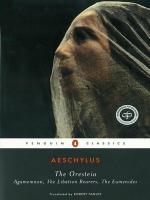|
|
The Eumenides Topic Tracking: Motherhood
Motherhood 1: The Pythia shows reverence to Mother Earth, the goddess from whom all of the other gods were born. Mother Earth was the first owner of the Temple of Apollo at Delphi. Eventually giving it to her daughter, Themis. Motherhood is portrayed in a respectful way.
Motherhood 2: Clytaemnestra insists that Orestes has committed the most wicked crime of all by murdering his own mother. She calls herself a "mother snake," implying that the avenging Furies are her children. Here she is not a kind mother, but instead she is the mother of harsh revenge.
Motherhood 3: As Iphigenia's mother, Clytaemnestra felt that it was her duty to avenge her eldest daughter's death by murdering Agamemnon. She is very protective of her children, just as Orestes is equally protective of Agamemnon by eventually murdering Clytaemnestra.
Motherhood 4: The Furies state that matricide is the worst crime that one can commit, because a child should have the highest respect for his mother. Apollo disagrees, insisting that it is a more wrongful crime for a wife to instead kill her own husband. He has less respect towards motherhood than the Furies have, probably because he is a male and favors Orestes.
Motherhood 5: Although Apollo states that he will protect Orestes, the Furies proclaim that the "mother blood" binds them to torment Orestes. Because he has shed the blood of his own mother, Clytaemnestra, the Furies feel that it is their duty to punish him for this crime, although Apollo doesn't think that there is any need for this at all.
Motherhood 6: It is evident that Orestes did indeed murder his mother, Clytaemnestra, but Apollo wishes to excuse Orestes from any punishment because he was avenging his father's wrongful death. The Furies, however, insist that the circumstances surrounding the murder are irrelevant, and Orestes must be punished to set an example to other people who might want to kill their mothers.
Motherhood 7: The Furies justify Clytaemnestra's actions because she was avenging the death of her eldest daughter, Iphigenia, whom Agamemnon had sacrificed at Aulis, declaring that it is a mother's right to defend the honor of her children. Apollo replies that the manner in which Clytaemnestra murdered her husband was so cruel and dishonorable that she demanded a just punishment such as what she received at the hands of Orestes.
Motherhood 8: Apollo states that mothers are not in fact blood relatives of their children, suggesting that they are merely vessels to hold the growing man's seed within her, just as a fertile field grows crops until they are ready to be harvested. He refers to Athena as an example, since she was born out of Zeus' head without the assistance of any woman.
Motherhood 9: The avenging Furies call themselves the children of darkness, declaring that Night is their mother. This suggests that they are the opposite of Apollo, who is god of light and truth. In contrast, the Furies are goddesses of darkness.
Motherhood 10: No longer children of darkness, the Furies become protectors of Athens together with Athena. Clytaemnestra's appeals for revenge are forgotten, and motherhood is cast aside as inferior to the father's role in developing a child due to Athena's tie-breaking vote that acquits Orestes of all accusations. She accepts Apollo's argument that women are merely vessels to hold the growing seed that the man has implanted within them.




